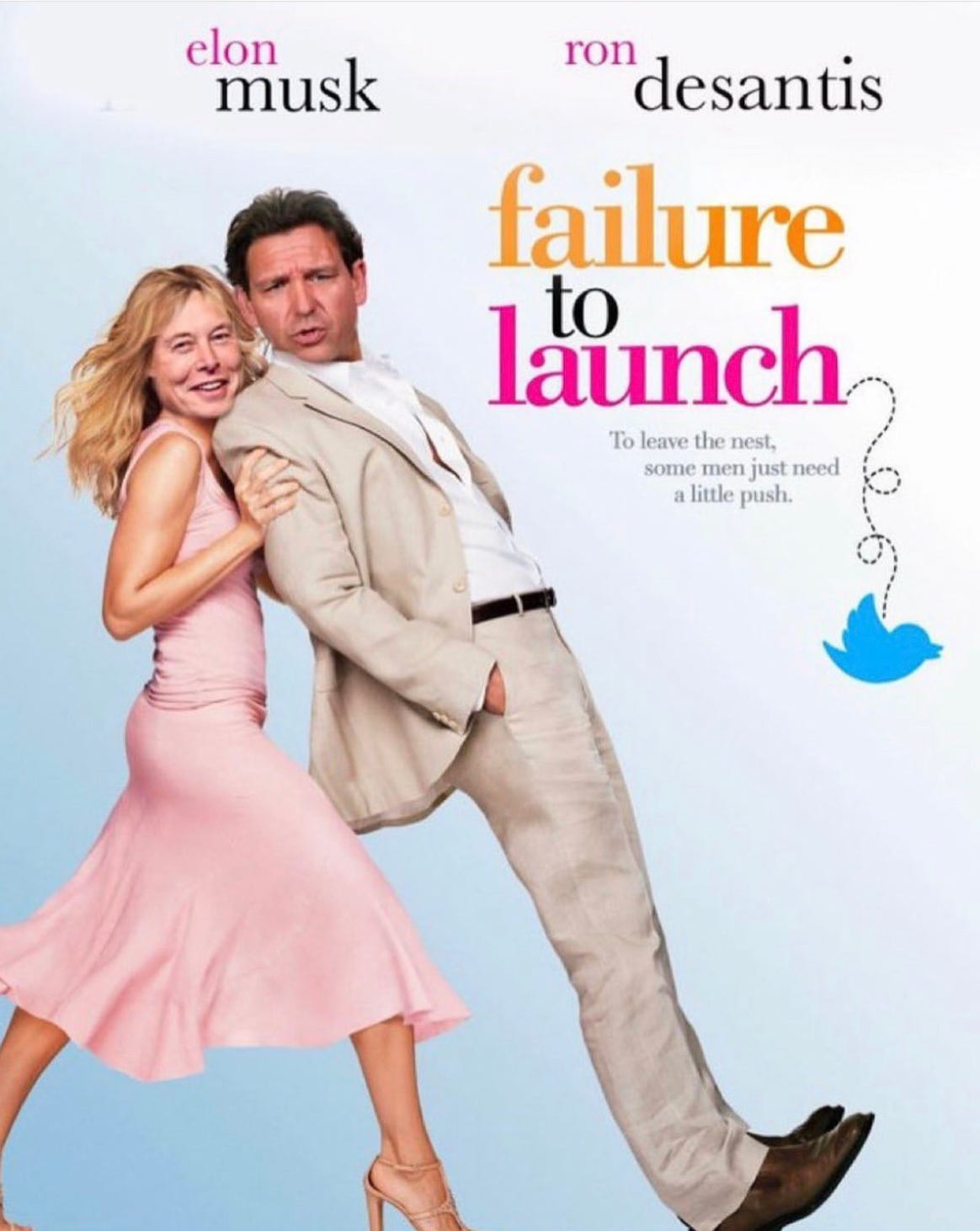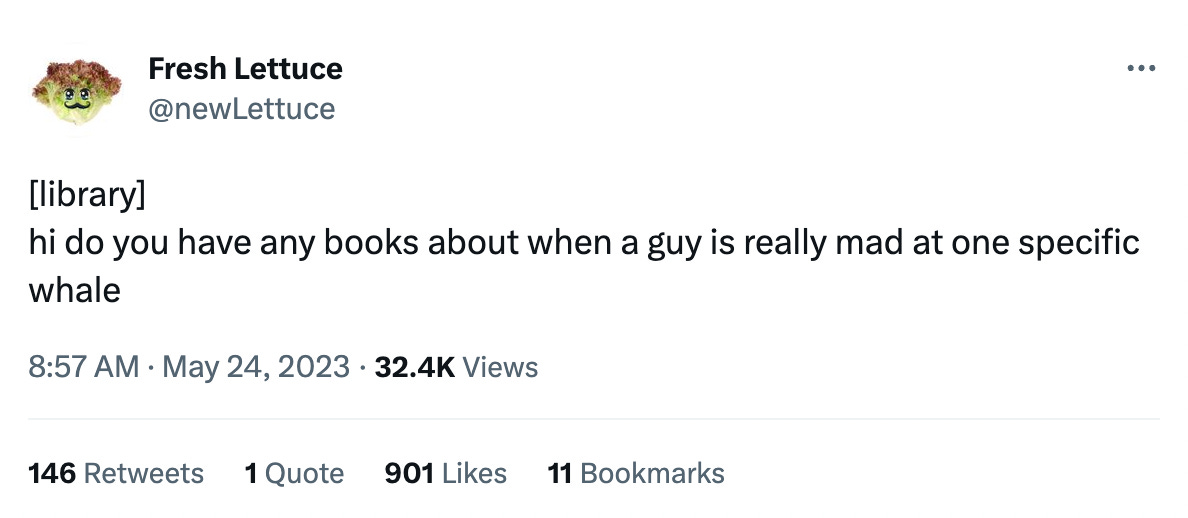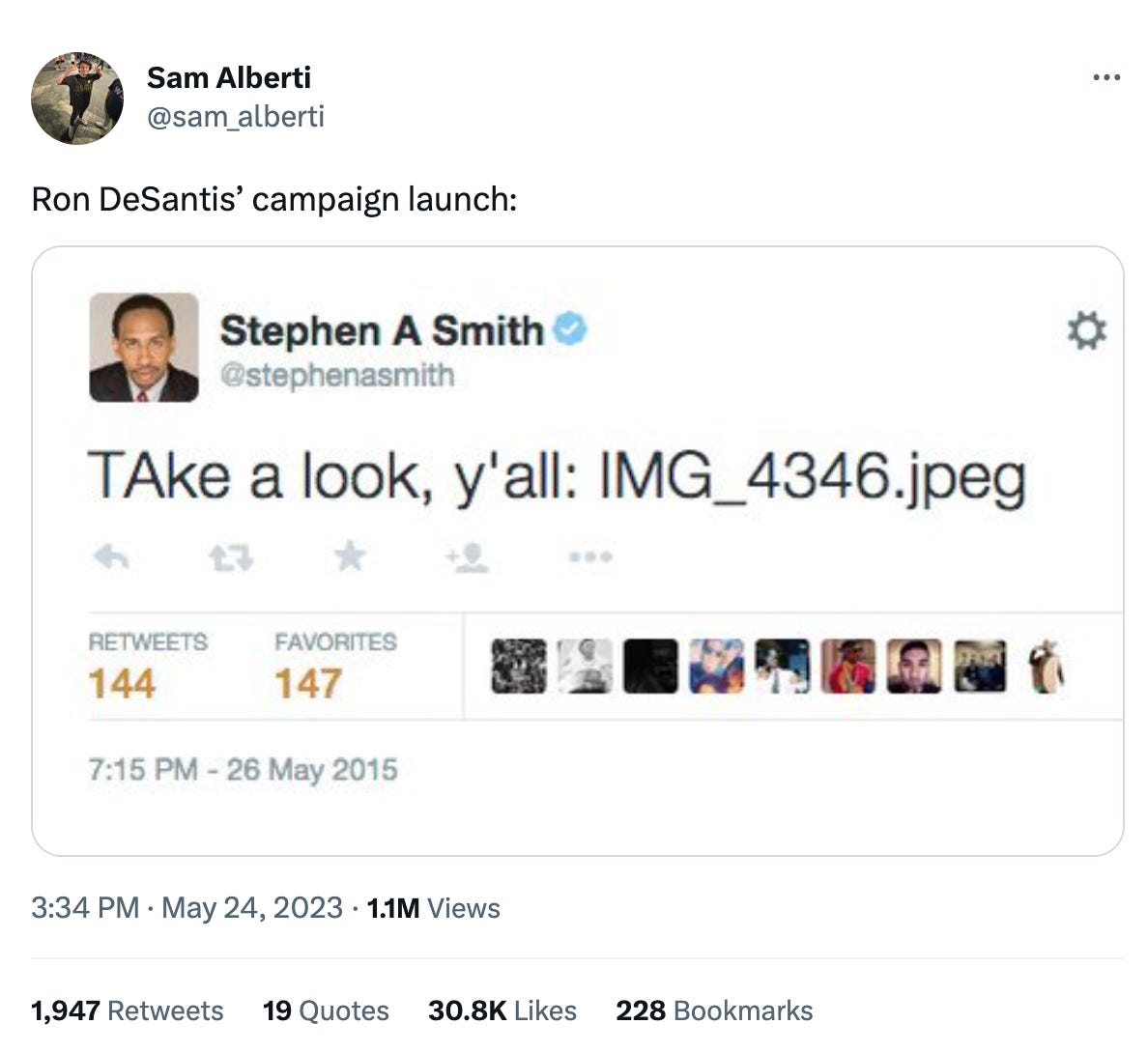Inside Twitter's failed Space launch
How a decimated team and shrinking server capacity rained on Ron DeSantis' parade

Programming note: Platformer will be off Monday for Memorial Day.
At around 5PM PT on Wednesday, Elon Musk and David Sacks joined a call with Florida Gov. Ron DeSantis’ campaign manager, Generra Peck. Their task: to explain what the hell had just happened.
Their high-profile event on Twitter Spaces, where DeSantis had just announced his run for president, had been plagued by technical glitches. The first audio livestream cut out before DeSantis could get his news out. The second one fared little better, drawing roughly 700,000 listeners at its peak. For context, Fox News claimed it drew 7.7 million viewers for Trump’s Tulsa rally in 2020.
Musk attempted to put a positive spin on the day’s events. He gave Peck “behind the scenes details from Twitter as they handled the nearly 1 million people trying to get into the Spaces room,” Peck tweeted.
The rest of her tweet fell short on details, though. So, for those who didn’t get a call from Musk yesterday, here’s what sources told Platformer about what was happening behind the scenes.
Perhaps the most important thing to know about Spaces’ technical problems: over the past several months Musk cut the Spaces team, which once numbered as many as 100 employees, down to roughly three people.
For months now, the Spaces team has been operating without most of the institutional knowledge it accumulated since Twitter added live audio conversations in 2021 to compete with then-hot Clubhouse.
“Practically no one remaining knows the current architecture in depth,” one person lamented on the pseudonymous employee forum Blind.
In November, a senior engineering manager on the team posted a message on LinkedIn saying the whole team was available for hire. At least some members of the team were discussing a possible acquisition with Automattic, but it’s unclear where those discussions landed.
“Does this mean Twitter (aka Elon) is killing Spaces?” someone asked in response to the post. “That has literally been one of the most useful features for connecting with others and bringing me back to the site.” The engineer responded simply: 🤷♂️.
Spaces are hosted on Twitter’s own servers and servers rented from Amazon Web Services. AWS servers for Spaces are “insanely underprovisioned” relative to the need for them, according to a former employee who worked on the project.
On Wednesday, the lack of servers led to a predictable series of cascading failures. In the run-up to the event, engineers expected that Spaces would be able to accommodate hundreds of thousands of users. But too many people joined the first stream simultaneously, and the app kept crashing as a result.
Musk’s own Twitter app crashed repeatedly during the event, we’re told. Musk, who uses the employee-only build of the app known as Earlybird, was said to be furious afterward.
The situation reflects the fact that the small Spaces team did not conduct stress tests of the system before the event. (The New York Times reported this detail yesterday.)
In response to the failure, and in anticipation of more large-scale events taking place on Spaces, Twitter plans to increase its server capacity, we’re told.
The core Spaces infrastructure is based off of Periscope, the live video streaming app that Twitter acquired in 2015. The technology has not been fully integrated into Twitter’s tech stack, the Guardian reported today. We ran that by current and former Twitter employees, who agreed with the sentiment. “Spaces is just Periscope infra with blue lipstick on,” one told us.
Inside the largest Slack and Discord channels of former tweeps, the mood after DeSantis’ botched announcement was nothing short of jubilant. People shared the “failure to launch” meme that circulated on Twitter, and joked about David Sacks’ grandiose claims regarding the size of the event. (Congresswoman Alexandria Ocasio-Cortez noted that “we had more people join when I played Among Us” on Twitch in 2020.)
Musk, for his part, followed up with another Space on Thursday focused on accelerating the adoption of electric vehicles. About 86,000 people joined.
For all its shortcomings, Wednesday’s event did show how increasingly central Twitter has become to the right-wing project. (See also John Herrman on this point.) With new programming on its way from fired Fox News demagogue Tucker Carlson and Ben Shapiro’s Daily Wire, Musk’s Twitter is quickly transforming into a more populous Parler.
While Donald Trump has so far chosen to stay away from the platform, Twitter’s embrace by a growing number of other right-wing figures has led some to compare it to a kind of Fox News for millennials. Perhaps Musk and his allies can succeed in reinventing Twitter as a media company. Or perhaps, as Liz Lopatto notes here, Twitter’s upper ceiling in that regard is as a second-screen companion for discussing cable TV.
Surely we’ll learn more as election season gets underway. In the meantime, though, employees on Blind worried that Wednesday’s failure might lead the Spaces team to shrink even further.
“Musk will blame one (or more) of us and fire,” one said. “That’s his MO.”
Pushback
Some of you thought I accepted too many of the surgeon general’s conclusions in the warning he issued this week about youth and social media. You noted that an advisory opinion from the American Psychological Association this month found that:
Using social media is not inherently beneficial or harmful to young people. Adolescents’ lives online both reflect and impact their offline lives. In most cases, the effects of social media are dependent on adolescents’ own personal and psychological characteristics and social circumstances—intersecting with the specific content, features, or functions that are afforded within many social media platforms. In other words, the effects of social media likely depend on what teens can do and see online, teens’ preexisting strengths or vulnerabilities, and the contexts in which they grow up.
I also heard that the surgeon general inferred too much causation from research that primarily documents correlations, and that the warning should be considered in relation to the politics of the person who appointed him, President Biden, who has an open disdain for social networks.
All of that is worth taking into account. I reject simplistic narratives that put social networks at the root of all ills experienced by young people, and it seems unlikely to me that the median 16-year-old is at any significant risk of harm simply from routinely using an app like Instagram or TikTok. everyone agrees that more research is needed.
At the same time, I do think that the people pushing me to reject the surgeon general’s warning are at least to some extent whistling past the graveyard. It seems clear to me that some subset of young people is at risk of bad mental health outcomes related to their social media usage, and responsible companies would seek to understand that more deeply rather than to insist that it can’t possibly be true.
On the podcast this week: AI safety researcher Ajeya Cotra joins to lay out the doomsday scenarios keeping the industry up at night. Plus: Kevin and I discuss the surgeon general’s warning about youth and social media, and play a round of HatGPT.
Apple | Spotify | Stitcher | Amazon | Google
Governing
OpenAI CEO Sam Altman warned a U.K. crowd that accelerating regulatory pressure on AI in the European Union may force the company to pull its services from all member states. (Richard Waters, Madhumita Murgia and Javier Espinoza / Financial Times)
Altman’s speech in London on Wednesday is part of a world tour visiting 17 major cities around the globe, where he plans to talk up the benefits of AI and call for regulation. Altman’s stop in London was met by protesters, who said his vision for the future of AI is dangerous. (Morgan Meaker / Wired)
Microsoft President Brad Smith said the company is calling for a new U.S. agency to regulate AI and oversee licensing requirements to operate powerful tools with “safety brakes” built in. It echoes a similar call from OpenAI. (Anna Edgerton and Dina Bass / Bloomberg)
A profile of Smith details his long-held fascination with AI ethics and safety, as well his perspective on how best to regulate the technology. (Cat Zakrzewski / The Washington Post)
U.S. Solicitor General Elizabeth Prelogar sided with Google in a brief advising the Supreme Court not to take up an appeals case from Genius over the posting of song lyrics in search results. (Blake Brittain / Reuters)
EU competition chief Margrethe Vestager said that her agency’s disagreement with U.K. regulators on the Microsoft-Activision merger raised “really important questions” about their assessments and future cooperation. (Samuel Stolton / Bloomberg)
A joint investigation found that Azerbaijan has been deploying NSO Group’s Pegasus spyware on Armenian human rights activists, journalists and other civil society members. (Natalia Krapiva and Giulio Coppi / Access Now)
Twitter is giving academic researchers until the end of the month to delete any data they may have received under past company leadership or else pay $42,000 per month for API access. (Chris Stokel-Walker / iNews)
Amazon said it will close its China app store, which it originally launched back in 2011, in July without elaborating on why. (Coco Feng / South China Morning Post)
Industry
Google is starting to let users into its Search Labs testing program, which includes its new Search Generative Experience that replaces standard search results with an AI-generated summary. (David Pierce / The Verge)
OpenAI’s ChatGPT iOS app is now available in 11 more countries, including Germany, France and the U.K. (Stan Schroeder / Mashable)
OpenAI closed a $175 million investment fund it had originally set up in 2021 with the backing of Microsoft to invest in other startups, according to an SEC filing. (Kate Clark / The Information)
OpenAI said it’s launching a program to award $100,000 grants to 10 individuals or organizations interested in experimenting with democratic rule-setting for AI systems. (Kyle Wiggers / TechCrunch)
TikTok is testing an AI chatbot called “Tako” that would exist on the righthand side of the app’s interface for answering questions about a video or offering recommendations. (Sarah Perez / TechCrunch)
Spotify is developing AI ads using voice models trained to mimic its podcast hosts, The Ringer co-founder Bill Simmons revealed. For that moment when you simply cannot recommend another mattress. (Will Gendron / Business Insider)
AI-powered voice synthesis is leading to the rise of generative podcasts featuring fake voices of hosts like Joe Rogan in full conversation with fake guests. Others are cloning their own voices and having conversations with themselves. (Kate Knibbs / Wired)
Grimes reviewed five AI-generated songs using custom software she created that mimics her voice after saying she would evenly split royalties with songwriters. She said all of them were, in fact, quite good. (Joe Coscarelli / The New York Times)
Google combined its DeepMind and Google Brain divisions, and the joint unit’s newest project is using a visual language model to analyze YouTube Shorts videos and generate text descriptions. (Jay Peters / The Verge)
Google said it would shut down its ephemeral YouTube Stories feature next month to focus resources on Shorts and other products. (Sarah Perez / TechCrunch)
Twitter announced a new API tier costing $5,000 per month designed for “startups scaling their business.” (Ivan Mehta / TechCrunch)
WhatsApp is testing the option to set a username, instead of a phone number, as the primary form of account identity in its most recent Android beta. (Ivan Mehta / TechCrunch)
Researchers in Switzerland used a novel brain-spine interface to restore physical movements to a paralyzed man by using AI software to translate the patient’s thoughts into muscle movements. (Oliver Whang / The New York Times)
Those good tweets
For more good tweets every day, follow Casey’s Instagram stories.
(Link)
(Link)
(Link)
Talk to us
Send us tips, comments, questions, and broken Spaces: casey@platformer.news and zoe@platformer.news.







We should stop calling them people and start calling them accounts. About 86,000 *accounts* joined Musk's Twitter Space.
Looking forward to hearing your guys' podcast discussion on surgeon general/social media tomo. Everything you've written on the topic has totally resonated with me Casey.